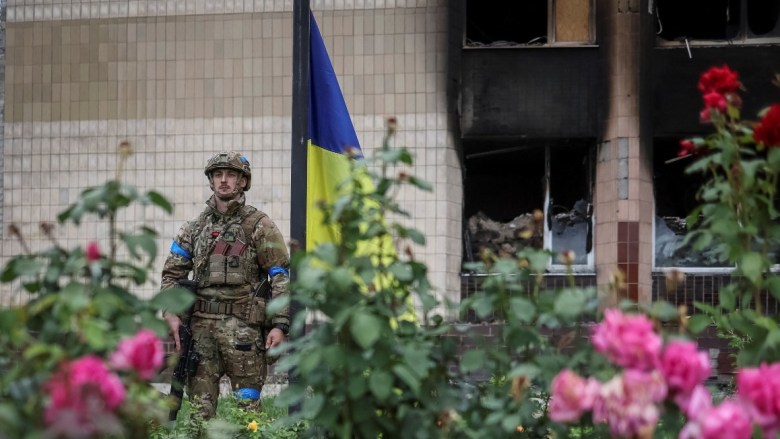
What questions can be asked, in all good conscience, of people living in a war zone? It would have been unthinkable to ask them to relive the things they’d seen.
Some wrote late at night because they couldn’t sleep; some wrote during breaks in combat. In a message that summed up the undertone of so many of the conversations, one young man put it plainly: “As long as I am alive, I’m in touch,” he typed to me.
I wanted to be of aid by sharing their perspectives. They were welcoming — receptive — insisting, often, that they could answer any question, even painful ones.
But what was there to say — to the man who’d had to choose between his child and parents — to the girl who’d just described escaping an attempted rape, and didn’t seem to understand what almost happened — to the 22-year-old soldier in a bomb shelter who stopped me mid-interview to say “Your profile photo — it’s very beautiful,” in a voice so sad and tired the six words took eleven seconds to say.
I told them that the questions would be gentle. I was here to help, not hurt them. The last thing that I wanted was to bring them extra pain.
In attempting to construct a question that was gentle, however, I accidentally asked something important. Many here, I explained, had known little about Ukraine up until several months ago. Now they knew it only through the context of the war.
Ukraine, I ventured, should be known for her full self. Not just how she was bombed.
I talked to them about my own home region — the orange blossoms and the eucalyptus, the sound of old Mexican guitars — and, using this as an example, I asked them what they thought of when they thought about Ukraine.
From homes and bomb shelters throughout the country, from refuges across the border — in English, in Ukrainian through translators, or else in borrowed languages we shared — the memories poured in: a collection of first-hand descriptions of Ukraine’s last days of normalcy.
They talked about the old folks, and how they used to joke with strangers on the trolleys. Kyiv was all in lilac every May. Kharkiv always used to smell of linden blossoms every June.
They remembered the taste of Lviv wiśniówka — the fat cats sunning in the streets in seaside cities like Odessa — summer holidays to the Black Sea coastline: packing far too many dresses, then not bothering to change once they arrived.
They talked about the dreamy magic of drunken evening walks through cities like Chernivtsi and Ivano-Frankivsk — every city with its own atmosphere, its own romance.
I heard about the girl at the espresso cart at work — about a cozy cafe always packed with regulars who all knew each other’s names. Warm acquaintances — friends who weren’t quite friends, now scattered across Europe — they didn’t say it, but it went unspoken: They would never all be in one place again.
I didn’t want to make them talk about the horrors: so we went on, talking about the beauty of the better days.
They talked about black soil and warm summers — sharing coffee with a boy atop Witch Mountain — teenage dates on the Dnipro River — eating blueberries in the Carpathians with friends.
Awful little roads, and unpredictable weather — the smell of hay and flowers — the peonies that bloomed in people’s gardens every year when school was ending, and what the wheat fields looked like through the window of a moving train.
“Before the war, I dreamed of going to another country, where it is warm,” one woman told me. “Right now, I don’t want to leave Ukraine.”
Gradually, increasingly, I realized the teenagers I spoke to sounded like the old folks of my childhood, as they looked back on the moments war had stolen. “I remember how live music was always played in the evenings in Podil in Kyiv, everyone danced and laughed,” one girl reflected. Seventy-five years or just six months, it made no difference. The absence was the same.
Somewhere, in the midst of all the coverage, we in America had forgotten our own ignorance. We’d grieved the theft without knowing what was taken. Perhaps it was just as well. No travel guide or textbook ever could impart the things that people miss the most about their country when its future is at stake.
Again and again, writing in from different cities, they unwittingly echoed one another’s recollections: a hundred young men and young women, all strangers to each other, remembering the same things. And again and again, I heard a line that was delivered so casually it sounded almost like a joke — but really was no joke at all.
“It’s beautiful. You should come visit sometime,” they told me lightly. “After the victory.”
Kat Splane is a San Diego-based freelance journalist.

